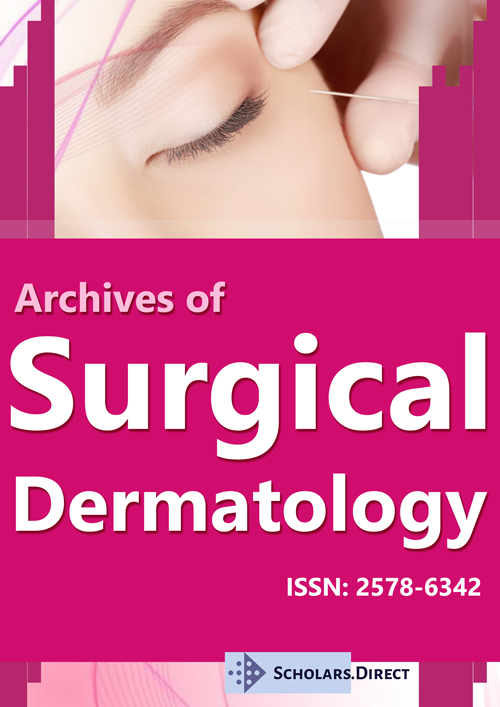Predictors for Preoperative Anxiety in Patients Undergoing Mohs Micrographic Surgery for the First Time: A Prospective Cohort Study
Keywords
Skin cancer, Mohs micrographic surgery, Preoperative anxiety, Basal cell carcinoma, Squamous cell carcinoma
Introduction
Positive patient experience in Mohs micrographic surgery (MMS) is affected by multiple factors preoperatively, intraoperatively, and postoperatively [1]. Almost half of patients contacted one week prior to MMS report preoperative anxiety. Higher levels of perioperative anxiety increase information overload, decrease retention and increase patient confusion. Although prior research is mixed regarding the utility of pre-operative visits, preoperative telephone consultations may be associated with decreased anxiety [2]. We sought to investigate patient factors most associated with increased preoperative anxiety in order to identify patient populations who could benefit most from appropriate pre-operative interventions. We hypothesized that younger, female patients with a history of surgical complications would report higher pre-operative anxiety, in line with prior research [3,4].
Adults undergoing MMS for the first time for basal cell carcinoma (BCC) or squamous cell carcinoma (SCC) between December 2020 and February 2022 were prospectively asked to complete surveys measuring preoperative anxiety using a Visual Analogue Scale (0-10) in the waiting room after their first Mohs layer was taken. Medical charts were reviewed for demographic and surgical characteristics. Univariate and adjusted logistic regressions with Firth’s bias reduction were performed on the top one-third of anxiety scorers to assess associations between patient and surgical characteristics and preoperative anxiety [5]. This study was approved by the Johns Hopkins Institutional Review Board.
A total of 104 patients were consented and completed the survey. Cohort demographics are provided in Table 1. The median preoperative anxiety score was 3 (interquartile range 1-5). Preoperative anxiety was not associated with age, gender, history of surgical complications, tumor location, or time from biopsy to MMS (p > 0.05). Patients with a self-reported history of anxiety (aOR 19.38, 95% CI 2.03-184.69), active smokers (aOR 8.60, 95% CI 1.09-68.04), and patients with a larger family size (aOR 8.88, 95% CI 1.72-45.86) were more likely to report higher preoperative anxiety. Higher preoperative anxiety was also associated with undergoing MMS for SCC compared to BCC (aOR 6.45, 95% CI 1.19-35.00; Table 2).
These findings suggest that various patient factors may be used to proactively identify patients at increased risk of preoperative anxiety before MMS. One potential explanation for our findings is that patients may be attuned to the potentially more aggressive behavior of SCC, compared to BCC, as well as the poorer post-surgical wound healing that is seen in smokers. It is also possible that patients with larger households may be burdened by postoperative handicaps that make it difficult to care for their households, thereby increasing preoperative anxiety. We found that patients with a self-reported history of anxiety had a significantly increased risk of higher preoperative anxiety. However, age, gender, and history of surgical complications were not associated with higher preoperative anxiety, in contrast with prior research. Although our data is limited to one institution with a small sample size, this study is unique in its use of the validated VAS to assess preoperative anxiety, as well as inclusion of only patients undergoing MMS for the first time. Additionally, administration of the VAS after the first Mohs layer was completed may have introduced recall bias in the assessment of preoperative anxiety. Further study is also needed to determine the ideal patient-centered intervention to alleviate preoperative anxiety in patients with the identified risk factors.
Financial Disclosure
The authors report no financial disclosures.
Conflict of Interest
The authors report no conflicts of interest relevant to this work.
Funding
None.
Patient Consent
Not applicable.
IRB
This study was approved by the Johns Hopkins IRB (IRB00267056).
References
- Kossintseva I, Zloty D (2017) Determinants and timeline of perioperative anxiety in Mohs surgery. Dermatol Surg 43: 1029-1035.
- Sobanko JF, Da Silva D, Chiesa Fuxench ZC, et al. (2017) Preoperative telephone consultation does not decrease patient anxiety before Mohs micrographic surgery. J Am Acad Dermatol 76: 519-526.
- Kruchevsky D, Hirth J, Capucha T, et al. (2021) Triggers of preoperative anxiety in patients undergoing Mohs micrographic surgery. Dermatol Surg 47: 1110-1112.
- Kokoska RE, Szeto MD, Steadman L, et al. (2022) Analysis of factors contributing to perioperative Mohs micrographic surgery anxiety: Patient survey study at an academic center. Dermatol Surg 48: 1279-1282.
- Heinze G, Schemper M (2002) A solution to the problem of separation in logistic regression. Stat Med 21: 2409-2419.
Corresponding Author
Shirley Lin, BS, Department of Dermatology, Johns Hopkins University School of Medicine, Johns Hopkins Outpatient Center, Room 8072, 601 N. Caroline St., Baltimore, MD 21287, USA.
Copyright
© 2023 Eseonu A, et al. This is an open-access article distributed under the terms of the Creative Commons Attribution License, which permits unrestricted use, distribution, and reproduction in any medium, provided the original author and source are credited.




